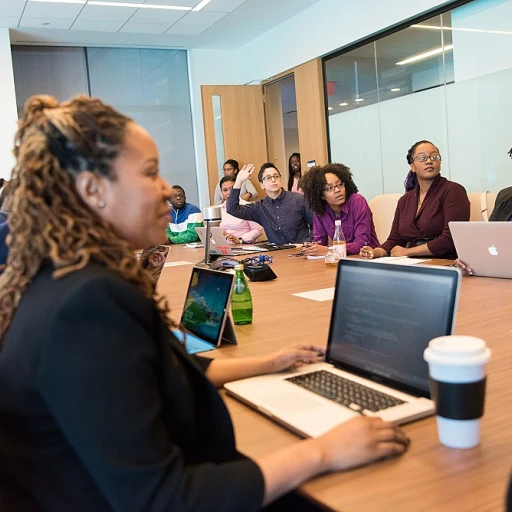Understanding the Importance of Pre-Hire Solutions
Recognizing the Value of Pre-Hire Solutions
In the competitive landscapes of retail and hospitality, the hiring process is more than just filling vacancies. It's about strategically enhancing the candidate experience to attract the best talent. Pre-hire solutions play a crucial role in this, offering a proactive approach to recruitment that can significantly improve the overall employee experience.
Understanding the importance of these solutions begins with acknowledging the unique challenges faced by the retail and hospitality industries. High turnover rates, seasonal demands, and the need for exceptional service skills make it imperative to refine the hiring process. By implementing effective pre-hire strategies, businesses can ensure they are not only attracting but also retaining the right candidates.
Pre-hire solutions encompass a variety of tools and strategies designed to streamline the recruitment process. From background checks to screening and interview techniques, these solutions help in identifying the most suitable hospitality talent early in the process. This not only saves time but also enhances the employer brand, making the organization more attractive to potential hires.
Moreover, the integration of technology in pre-hire processes has revolutionized how hiring managers approach talent acquisition. With advanced analytics and AI-driven tools, businesses can now predict candidate success and fit more accurately, leading to better long-term staffing solutions.
For those looking to delve deeper into crafting an effective pre-hire strategy, exploring resources on crafting the perfect welcome email for new employees can provide valuable insights into enhancing the initial stages of the candidate journey.
Identifying Key Challenges in Retail and Hospitality Hiring
Addressing the Complexities in Workforce Acquisition
Recruitment in the retail and hospitality sectors poses unique challenges, impacting both employers and job seekers alike. The fast-paced nature of these industries, characterized by high turnover rates, demands an efficient and effective hiring process to attract and retain suitable candidates.
Retail and hospitality businesses often face an uphill battle when it comes to sourcing talent. The demand for excellent customer service necessitates finding candidates with both skills and passion. This makes the
candidate experience critical in the pre-hire stage to set a positive tone for future employment.
Moreover, the sheer volume of applications can be overwhelming for hiring managers who must sift through numerous resumes and conduct multiple interviews. This leads to a prolonged hiring process, leaving positions unfilled for extended periods and putting pressure on existing staff, thus affecting service quality.
Pre-hiring challenges are compounded by the need for rigorous background checks. In industries where customer interaction is paramount, ensuring a reliable workforce is crucial. Employers must also balance these needs with the task of maintaining a competitive and appealing employer brand to attract the best hospitality talent.
Additionally, the diversity of roles within the hospitality industry—from front-line staff to management—requires tailored staffing solutions. Each role demands specific skills, making a uniform recruitment process ineffective.
Navigating these complexities necessitates a strategic approach. Leveraging advanced screening techniques and enhancing the interview process can mitigate some of these challenges. Furthermore, staffing agencies can play a pivotal role by providing a consistent pipeline of hospitality workers ready for hire.
Ultimately, these challenges require tailored solutions to refine and streamline recruitment, making the quest for talent acquisition less daunting and more aligned with long-term business goals.
Optimizing Pre-Hire Assessments
Effectively enhancing the employee experience in the retail and hospitality sectors starts with a robust pre-hire assessment process. As industries that rely heavily on customer interaction and service quality, it is crucial that hiring managers implement assessment tools that identify the best candidates suited for these dynamic roles.
Pre-hire assessments serve as a vital screening tool in the early stages of the recruitment process. Retail and hospitality employers often face the challenge of sifting through numerous applications to find the right talent. By incorporating structured assessment tools, companies can streamline this process and reduce the time to hire. These tools can range from personality and skill assessments to cognitive ability tests, each designed to measure various aspects of potential employees' capabilities.
In the retail and hospitality industries, understanding the specific needs of the job is essential to tailor the assessments accordingly. For instance, a hospitality role may require assessing a candidate’s ability to handle high-pressure situations and deliver exceptional service consistently. Meanwhile, retail positions may call for evaluating skills related to product knowledge and customer interaction.
Moreover, integrating assessments into the hiring process not only improves staffing solutions but also enhances the candidate experience. Candidates appreciate transparency and a clear illustration of employer expectations, which contributes to a stronger employer brand and better talent acquisition outcomes.
As part of optimizing pre-hire strategies, technological advancements play a key role. With the development of digital platforms, assessments are now more accessible, providing a seamless experience both for candidates and hiring managers. The data-driven insights garnered from these tools are instrumental in making informed hiring decisions that align with long-term company goals.
In conclusion, leveraging the right assessment tools during the pre-hire phase not only addresses staffing challenges but also aligns with best practices in hospitality recruitment. By fostering a strategic recruitment process, businesses can ensure they attract the highest quality hospitality talent, ultimately leading to a more engaged and effective workforce.
For more insights into optimizing the experience of new employees and effective onboarding methods, consider exploring
emotional regulation in employee experience.
Role of Technology in Pre-Hire Processes
The Transformative Role of Technology in Pre-Hire Processes
In the fast-paced environments of retail and hospitality, the integration of technology in pre-hire processes has become indispensable. As staffing demands continue to grow, hiring managers rely heavily on tech solutions to streamline their recruitment processes, making them more efficient and cost-effective.
One of the standout transformations brought about by technology is the automation of candidate screening. Automated systems can quickly sift through large volumes of applicants, identifying top talent based on predefined criteria. This not only speeds up the time to hire but also ensures that hiring managers can focus their energies on engaging with the most promising candidates, enhancing overall candidate experience.
Moreover, technology facilitates sophisticated pre-hire assessment tools that go beyond traditional interview methods. These tools provide insights into a candidate's potential performance and cultural fit within the organization. By leveraging data analytics and AI, companies in the hospitality and retail sectors can predict which candidates are more likely to excel, thus reducing turnover rates in the long term.
Technology also plays a key role in maintaining a robust employer brand. A streamlined application process supported by user-friendly platforms can significantly improve a candidate's first impression. When applicants find that a company's recruitment process is efficient and modern, it enhances the perceived quality of the organization, a crucial factor in attracting quality hospitality talent.
Additionally, background checks, which are a critical component of the pre-hire process, have been revolutionized by technological advancements. These are now conducted more comprehensively and rapidly, ensuring that hiring managers have the necessary information to make informed decisions.
Overall, the adoption of technology in pre-hire processes is not just a trend but a strategic necessity in the retail and hospitality industry. Employers who effectively embrace these advancements are poised to lead in attracting and retaining the best talent amid a competitive job market.
Training and Development as Pre-Hire Strategies
The Influence of Training and Development in Pre-Hire Strategies
The integration of training and development as part of pre-hire strategies is a crucial component in enhancing employee experience within the retail and hospitality sectors. In both of these industries, the pressure is consistently high, necessitating well-prepared workers capable of delivering exceptional service. Here's why focusing on training and development before hiring can greatly benefit the recruitment process and long-term talent retention.
Firstly, investing in pre-hire training solutions tackles one of the most pressing challenges: the shortage of appropriately skilled hospitality talent. By identifying and addressing skill gaps early in the hiring process, employers ensure that candidates are better prepared to meet industry demands from the get-go. This proactive approach not only enhances candidate experience but also equips potential hires with the tools they need to thrive in a dynamic environment.
Moreover, pre-hire development programs serve as an excellent way for staffing agencies and employers to gauge candidates' adaptability and learning agility. Through structured training modules, hiring managers can assess how quickly candidates can pick up necessary skills and integrate into the hospitality staffing or retail service. This insight is invaluable, particularly in time-sensitive hiring environments where time to hire is critical.
Employers may also find that such emphasis on training boosts their employer brand. Organizations known for investing in their prospective employees’ growth often attract high-quality candidates interested in long-term career development within the hospitality industry. This focus on nurturing future employees can significantly enhance hospitality recruitment and talent acquisition efforts.
Finally, comprehensive training and development strategies, when implemented as part of pre-hire processes, create a more seamless transition into full-time roles. Candidates entering positions with preparedness gained from pre-screening and training experiences are more likely to adapt quickly to their roles, leading to improved job performance and reduced turnover rates.
In conclusion, leveraging training and development as pre-hire strategies not only enhances the recruitment process but also sets a solid foundation for future success in the retail and hospitality arenas. Prioritizing these strategies is essential for any organization aiming to establish robust staffing solutions that support sustainable growth and superior candidate experience.
Measuring the Success of Pre-Hire Solutions
Evaluating the Impact of Pre-Hire Innovations
In the continually evolving retail and hospitality industries, recognizing the success of pre-hire solutions is crucial for adapting hiring strategies to meet today’s challenges. By effectively measuring these processes, businesses can enhance their recruitment strategies, ensuring candidates experience a smooth transition from screening to employment.
Quantifying the success of pre-hire strategies begins by analyzing recruitment metrics. This includes evaluating time to hire, cost per hire, and quality of hire metrics. The time taken to fill a position reflects the efficiency of the hiring process. A shorter time to hire usually indicates an effective staffing strategy, reducing the risk of losing top hospitality talent to competitors.
Quality of hire is another essential measurement. This can be assessed by examining employee performance data, retention rates, and feedback from hiring managers and hospitality staffing teams. High retention rates suggest successful pre-hire assessment tools and a well-defined recruitment process.
Another valuable approach is conducting candidate feedback surveys. This provides insights into the candidate experience—a vital aspect of employer brand development. Ensuring a positive candidate experience can turn job seekers into brand advocates, enhancing the organization’s reputation in the hospitality industry.
To further refine pre-hire solutions, businesses should integrate background checks and behavioral assessments into the process. These tools offer deeper insights into a candidate’s suitability for hospitality roles, increasing the likelihood of hiring long-term, dedicated hospitality workers.
Lastly, leveraging technology is pivotal. Implementing advanced recruitment software and applicant tracking systems can optimize the hospitality recruitment process, making it easier to identify and acquire top-tier talent. As the industry leans towards smarter solutions, keeping abreast of hospitality news can offer the latest innovations in staffing solutions.
In summary, the success of pre-hire solutions in retail and hospitality is measurable through several key metrics and feedback mechanisms, each contributing to a more efficient and impactful hiring process.














